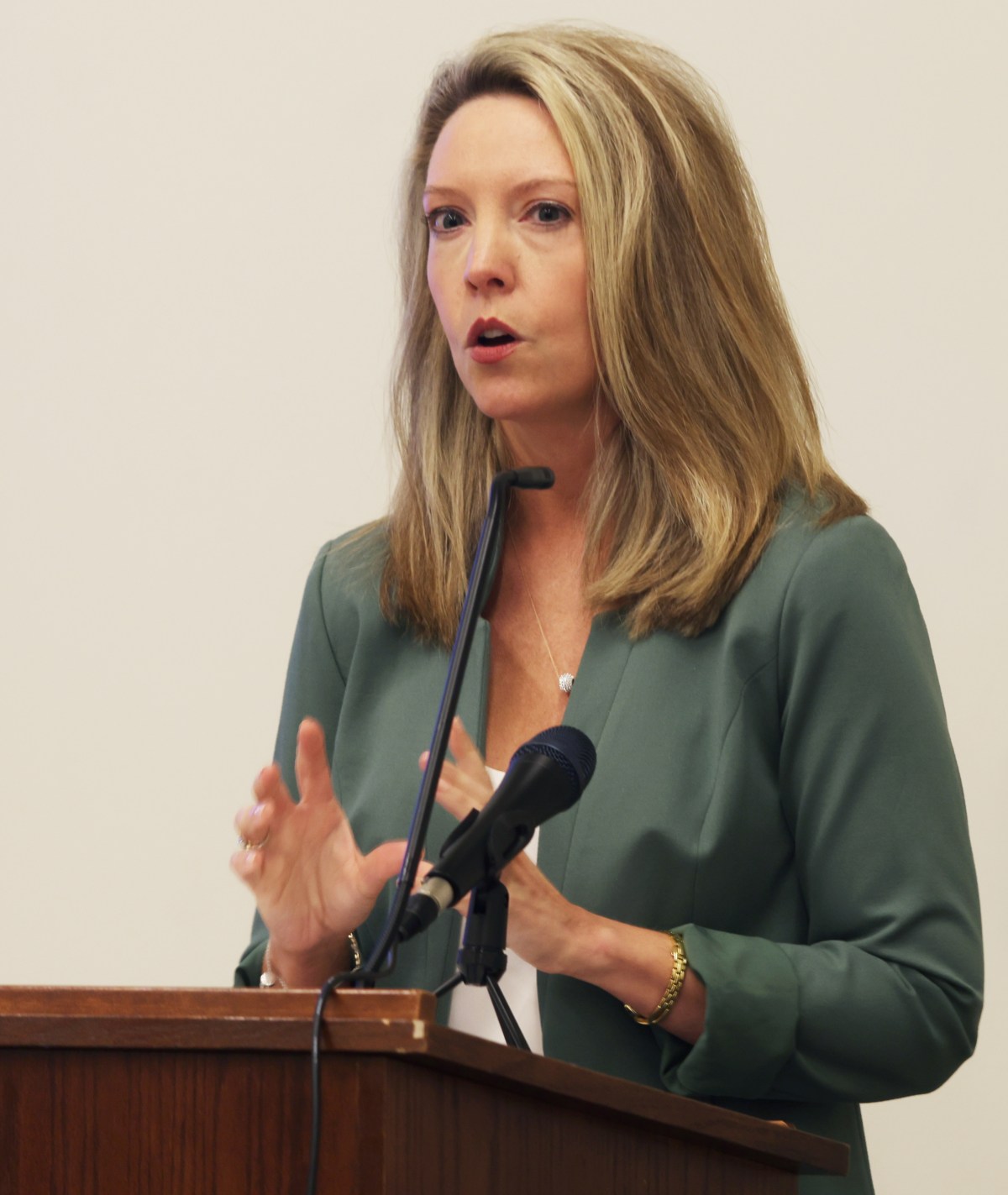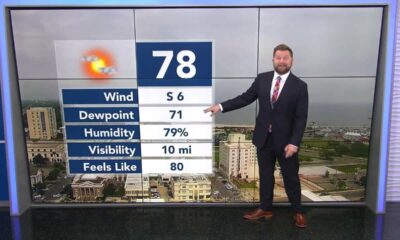Mississippi Today
Mississippi’s troubled mental health system shows signs of repair, report says

Mississippi's troubled mental health system shows signs of repair, report says
Fewer Mississippians in mental health crises are stuck waiting in jail cells for a hospital bed each day than they were a year ago, but the state has yet to eliminate the troubling practice completely, according to a new report.
The latest data available shows that from December to mid-January, an average of 23 people in crisis waited for a hospital bed each day. Eight of those waited in jail, despite not being charged with any crime.
Those numbers were much higher not long ago: In the first quarter of this fiscal year, which started in July, an average of 72 people waited for a bed with 24 in a jail cell each day. Similar numbers had been reported for the prior fiscal year.
“The scope of progress is substantial,” wrote Dr. Michael Hogan, the author of a court-mandated biannual report on the state of Mississippi's mental health system. “But the work is not complete, and some conditions remain that should satisfy no one.”
Hogan's report comes as the result of a 2016 lawsuit filed against the state by the U.S. Department of Justice. A judge sided with the federal government in 2019, finding the state had violated the Americans with Disabilities Act by separating people with mental illness in hospitals from their homes and families. Hogan, a former New York State Commissioner on Mental Health, is now tasked with writing the twice-yearly reports on the state's compliance with the lawsuit's consent agreement as a court monitor.
Ultimately, the report found DMH was compliant or in partial compliance with all key issues pointed out in the agreement.
“The Mississippi system could fairly be described as the most unbalanced state system in terms of preferences for institutional care in the country,” Hogan wrote, referring to alarming issues in patient care first documented by the DOJ in 2011. “As this report is being written, a decade of attention means this imbalance in care has been substantially addressed.”
Late in 2022, DMH reopened a 30-bed unit at East Mississippi State Hospital that had been closed because of staffing shortages. A closed 20-bed unit at Mississippi State Hospital was reopened in January. The added beds contributed to keeping people with mental illness out of jail cells.
Patient counts that the department supplied to Mississippi Today show the number of people waiting in jail for a state hospital bed has been steadily declining for months.
“This is not a small undertaking and is due to the unwavering dedication of an incredible team of staff at DMH Central Office, the four state hospitals, and community mental health centers who strive daily to improve the state's system of care,” the department's Executive Director Wendy Bailey told Mississippi Today in a statement, “and to state leaders and legislators who are supporting and funding the efforts.”
The latest report, the third ever, was published this week and charted much of the Mississippi's Department of Mental Health's progress in care access across the state. However, lingering staffing retention troubles, data collection and use, patient outreach and communication issues, and jail stays remain sore points in need of improvement, according to Hogan's report.
When community mental health centers were created 40 years ago – each with their own designated region – they operated with little oversight from the DMH, which focused on running state hospitals. As a result, statewide mental health care was often disjointed or inconsistent.
Hogan's report studied discharge documentation to better understand how often patients across the state were getting intervention to lessen the likelihood they hit a severe crisis point again requiring inpatient treatment.
While entering inpatient treatment can help stabilize severe mental illness, it doesn't cure it, Hogan points out. Follow ups are needed to prevent relapses and readmission. Hogan and his team found that community mental health centers contacted a hospitalized client, while the individual was in the hospital, at a rate of 45%.
He said “lukewarm success” in establishing relationships while people are still hospitalized makes impacts whether they attend a follow-up appointment after discharge. The overview found that initial visits were completed in 59 of 89 incidents they could track – about 66%. The rate of follow-up and engagement efforts were adequate in 56 of 87 cases they could track – or 64%.
“Some Regions do a good job on some elements and all do a good job some of the time,” Hogan wrote. “But consistency is lacking.” Workers like peer support specialists who help contact patients after discharge are often paid at or below what a fast food worker can make, Hogan pointed out. The staffing shortages among these roles were higher than that of other vacancies, such as registered nurses and therapists.
Bailey acknowledged the same hardships but hopes average annual salaries for those support staff positions reach $30,000 by fiscal year 2025. The department has asked the legislature for more funding to help raise wages and improve retention rates.
“We are not only dealing with competition from the private sector, we are dealing with burnout from staff dealing with patients who require 24/7 care who have significant mental and behavioral challenges,” Bailey said in her statement.
Hogan's first report, issued in March, described Mississippians sometimes waiting weeks in jail for a bed at a state hospital. He also found that some people admitted to state hospitals did not have a serious mental illness – meaning the hospital wasn't the right place for them and they were occupying a bed that could have been used by someone else.
In his second report, he surveyed North Mississippi State Hospital and community mental health centers in the northern part of the state and did not find patients admitted without a serious mental illness diagnosis.
Bailey said that DMH expects to also see more positive results from people now working as court liaisons who help staff identify community treatment options. The department has also grown programs that provide transitional housing, supported employment and community outreach over the last several years.
Recently the agency began fidelity monitoring, or progress monitoring, of its mobile crisis teams, another positive step Hogan recognized.
“Are there improvements still to be made?” Bailey posed, reflecting on state's mental health system. “Yes.”
“Has progress been accomplished? Absolutely.”
This article first appeared on Mississippi Today and is republished here under a Creative Commons license.
Mississippi Today
On this day in 1977
April 19, 1977

Alex Haley was awarded a special Pulitzer Prize for “Roots,” which was also adapted for television.
Network executives worried that the depiction of the brutality of the slave experience might scare away viewers. Instead, 130 Americans watched the epic miniseries, which meant that 85% of U.S. households watched the program.
The miniseries received 36 Emmy nominations and won nine. In 2016, the History Channel, Lifetime and A&E remade the miniseries, which won critical acclaim and received eight Emmy nominations.
This article first appeared on Mississippi Today and is republished here under a Creative Commons license.
Mississippi Today
Q&A: Explaining the health care coverage gap
Lawmakers and advocates regularly refer to Mississippians without health insurance who are in the “coverage gap.” But what is the coverage gap, why does it exist and how does it relate to Medicaid expansion?
Medicaid is a federal-state program that provides health coverage to millions of people in the U.S., including low-income adults, children, pregnant women, elderly adults and people with disabilities. States administer the program, which is funded by both states and the federal government. Mississippi participates in the traditional Medicaid program, but the Legislature is debating two differing proposals that would expand Medicaid.
The coverage gap refers to a certain group of uninsured people in states that have not expanded Medicaid under the Affordable Care Act, the federal health reform law enacted in 2010 under the Obama administration. The law sought to make health insurance affordable and accessible to more people and provides subsidies that lower costs for households with incomes between 100% and 400% of the federal poverty level, or between $18,210 and $72,840 in annual income, respectively, for an individual.
The Affordable Care Act also expanded Medicaid eligibility to adults under 64 years of age with income up to 138% of the federal poverty level – or $20,782 annually for an individual in 2024. But a U.S. Supreme Court ruling in 2012 made expansion optional, creating the “coverage gap” in states that did not opt to expand the federal-state program.
What is Medicaid?
What is the coverage gap?
Why does it exist?
In Mississippi and the nine other states that have not expanded Medicaid, there is a gap between people whose income is not low enough to qualify for non-expanded Medicaid but less than 100% of the federal poverty level, or about $15,000 a year for an individual, to qualify for subsidized insurance through the federal marketplace. To qualify for Medicaid in Mississippi under current regulations, one's household income must be less than 28% of the federal poverty level, or a mere $7,000 annually for a family of three. Non-disabled childless adults are not eligible for Medicaid unless they have another qualifying condition.
How many people fall into the coverage gap?
Roughly 74,000 Mississippians fall into the coverage gap, according to a recent KFF study. Nationally, the number is 1.5 million people.
What is Mississippi's uninsured population?
Mississippi had one of the highest uninsured rates among working-age people in the country in 2022 at 16.4%, according to the U.S. Census Bureau's American Community Survey.
Are people in the coverage gap employed?
In 2019, of the 178,000 uninsured Mississippians making below 138% of the poverty level, the majority – nearly 61% – were either working or looking for work. Many of those not in the labor force are unable to work due to a mental health or medical condition; lack of transportation; caring for a family member or recent incarceration, among other circumstances. More recent years' data has been skewed because of the COVID-19 pandemic and extended Medicaid coverage for people who would not have otherwise been eligible.
Nationally, according to KFF, the most common jobs of people in the coverage gap are cashiers, cooks, waiters-waitresses, construction/laborers retail salespeople and janitors.
What keeps businesses from offering health insurance to its employees or from offering it with reasonable deductibles?, according to Hilltop Institute at the University of Maryland, Baltimore County
Larger employers – those with over 50 employees – are required to offer health insurance to their employees or pay a penalty. For smaller employers, offering health insurance is not mandatory. And because it is often more expensive, smaller employers will offer benefits with higher deductibles and copays in order to reduce their own expenses. So those employed at a small business either may not have the option of health insurance or may choose to opt out because of cost.
Nearly 69% of private businesses in Mississippi employ fewer than 50 employees, according to the Agency for Healthcare Research and Quality. It's up to 95% when public employees are included, according to Hilltop Institute at the University of Maryland, Baltimore County.
How many people would the House and Senate plans make eligible for Medicaid, and how many of those are in the coverage gap?
The House plan – which is traditional expansion under the Affordable Care Act and would make Mississippi eligible for hundreds of millions of federal dollars – is estimated to cover 200,000 Mississippians. That would include people in the coverage gap and others.
The Senate plan – which is not traditional expansion and does not qualify the state for the federal match – would insure about 40,000 Mississippians. This would include only people in the coverage gap, or only those making up to 99% of the federal poverty level.
This article first appeared on Mississippi Today and is republished here under a Creative Commons license.
Mississippi Today
The unlikely Mississippi politician who could tank Medicaid expansion
Note: This editorial is featured in Mississippi Today's weekly legislative newsletter. Subscribe to our free newsletter for exclusive access to legislative analysis and up-to-date information about what's happening under the Capitol dome.
Lt. Gov. Delbert Hosemann is a good man who has dedicated his adult life to helping Mississippians.
That's why so many Mississippians are baffled by his dug-in position on Medicaid expansion, which right now threatens to kill one of the most transformative policy proposals that has moved through the Capitol since the 1980s.
Medicaid expansion would provide health insurance to 200,000 Mississippians, most of whom work in low-income, no-benefits jobs and cannot otherwise afford it. It would give so many of those people the chance to stay healthy and keep regular work for the first time in their lives. It would bring billions in additional federal money to the poorest state in the nation, where more than half our rural hospitals are on the verge of financial collapse and so many other needs are underfunded.
It would save lives and livelihoods, and it could legitimately change the trajectory of the state.
But Hosemann's stubborn position on one element of any potential expansion plan — requiring Medicaid recipients to work — jeopardizes the entire proposal. Across the nation, 13 states have tried to implement various forms of a work requirement for Medicaid recipients. The federal government, which runs and funds Medicaid, shot down all 13 efforts.
As legislative leaders will soon meet to try to agree on an expansion bill, Hosemann is doubling down on his insistence that any final plan include the work requirement, adding that its omission from a final bill will not get the Senate votes to pass. If he sticks to his guns, this would almost certainly mean Medicaid expansion dies in Mississippi.
“If you're not working, then you need to go get a job,” Hosemann said in a conservative radio interview just two days ago, reiterating his desire for a work requirement. “… We want them to be working. We have a 53.9% labor participation rate. That's horrific, the worst in the country … If you want a job in Mississippi, you can get one. And so we thought it was very important to have people who are working to have the opportunity to have health care. That's why we passed what we did.”
The state's labor participation rate is, indeed, dismal. But the lieutenant governor in the interview didn't mention the very legitimate reasons so many Mississippians, the unhealthiest American citizens with some of the nation's worst rates of chronic illnesses, cannot work. He did not detail the many financial barriers to those same Mississippians, who are the poorest in the nation, have to finding and keeping steady employment. He did not touch on the state's child care crisis, which for many Mississippians makes regular child care more expensive than what a person can make in a full-time minimum wage job.
READ MORE: To work, Selinda Walker needs health care. To get health care, she needs work.
The irony of Hosemann being the roadblock to passing Medicaid expansion is not lost on people who closely observe Mississippi politics. For years, Hosemann has been among the only prominent Republican leaders to express openness to it (though he has always refused to use the term “Medicaid expansion”). As he sat largely alone on that limb, conservative Republicans worked hard to use it against him, even helping earn him the moniker “Delbert the Democrat” from his 2023 GOP primary challenger Chris McDaniel.
On expansion and several other issues, Hosemann, who crushed McDaniel in that primary, has been a more moderate voice than most of his right-wing Republican counterparts. In a polarized state in a polarized political era, many people respect him greatly for that. Few modern Mississippi politicians could boast legitimate bipartisan support, but Hosemann certainly is on that list.
I've closely covered and gotten to know Hosemann for many years now. I've personally witnessed his strong character. I've taken up for him a great deal, even landing the nickname “Delbert's bootlicker-in-chief” from his political opponents last year. What I've seen is a measured, thoughtful and wildly intelligent leader. He's a true numbers guy and a policy wonk, and he's surrounded himself with smart advisers.
He's focused as much of his career on health care improvements as any modern Mississippi elected official. Before he entered public life, he was a legal adviser to health care organizations. Since he was elected, he's visited struggling hospitals and built strong relationships with the most important health leaders in the state, who have persistently talked with him about the benefits of expanding Medicaid. He even visited Arkansas before last year's legislative session to personally learn and study their unique expansion model. He knows what's at stake, and he knows the solutions.
Most people assumed Hosemann would be the out-front leader on expansion, but that has not yet happened. He appeared flat-footed when House Speaker Jason White pushed a traditional expansion plan through his GOP-controlled chamber with overwhelming ease. And what he proposed a month later is not an expansion plan at all.
Hosemann and his fellow Senate Republican leaders tossed aside the House proposal without public debate or serious consideration and proposed their own plan that would draw down hundreds of millions dollars less than the House's traditional expansion plan would. Additionally, the Senate plan would insure between 150,000-200,000 fewer Mississippians than the House plan.
But none of the differences in the House and Senate plans would matter at all if Hosemann keeps his heels dug in on the work requirement. The federal government will not approve it, and a federal court challenge — very much a shot in the dark during a big presidential election year — could cost state taxpayers millions and continue to leave people without health insurance and hospitals without financial help for years to come.
Across the nation, 20 Republican-controlled states expanded Medicaid even without being able to include their coveted work requirement. Those states came up with creative solutions that still drew down the full federal dollars and opened wide the door for increased health care access while instilling the value and importance of hard work.
Hosemann, often to his credit, has made a point to let Senate Republicans make their own decisions and not strong-arm them into unfavorable votes. But at the end of the day, some of the most transformative policy proposals require strong leadership. In North Carolina, for instance, the latest red state to expand Medicaid, bold and pragmatic leadership from the Republican Senate leader who previously stood against expansion prevailed.
“I felt that I had a certain responsibility — that if the reasons that I had articulated for 10 years no longer exist, then I had a responsibility to be honest with myself and be honest with other people about that,” Senate President Pro Tempore Phil Berger told The New York Times last year. “And so I talked to my members, and I told them where I was — and why.”
In 2020, Hosemann employed this exact strategy to help garner enough Republican votes to change the state flag, then the last in the nation containing the Confederate battle emblem. Those were tough votes for many Republicans, but one-by-one, Hosemann brought in the holdout senators, laid out his own position to them and asked them to consider changing their votes. It worked.
If Hosemann has a willingness to find creative solutions around the work requirement or talk to his Republican Senate colleagues about supporting a real Medicaid expansion program, he's not publicly expressed it. If he doesn't, lawmakers will likely go home without expansion in early May despite being closer to true transformation than ever.
Whether the effort passes or dies in the coming days will likely be in Hosemann's hands. But two major questions remain: Can the most prominent Republican champion of Medicaid expansion for years get it across the finish line? And does he even have the desire to?
READ MORE: Senate Republicans should know: This is literally life-or-death.
This article first appeared on Mississippi Today and is republished here under a Creative Commons license.
-
Mississippi News5 days ago
Mississippi will soon be bombarded with cicadas
-
SuperTalk FM4 days ago
4 tornadoes touched down in Mississippi during latest round of severe storms
-
SuperTalk FM2 days ago
Chance of parole denied for man who killed 3 Choctaw Indian tribal members
-
SuperTalk FM5 days ago
2 Jones County correctional officers arrested in smuggling bust
-
Mississippi News7 days ago
Columbus schools may see needed upgrades with bond issue
-
Local News5 days ago
Almost 3,500 Mississippi Veterans have enrolled in VA health care in past 365 days, 28% increase over last year
-
Kaiser Health News2 days ago
To Stop Fentanyl Deaths in Philadelphia, Knocking on Doors and Handing Out Overdose Kits
-
SuperTalk FM4 days ago
Amazon project in Madison County to be over $10B, create more jobs than projected: report










































